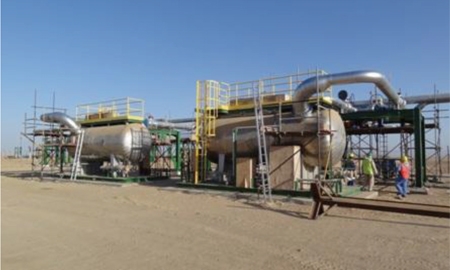Currently producing 15,000 barrels a day with estimated reserves of 100 million barrels, Lebanese-based
CC Energy Development (
CCED) is one of Oman’s greatest oil and gas success stories. A creative migrational theory led the company to new discoveries overlooked by numerous others in decades of drilling in Blocks 3 and 4 before CCED stepped onto the scene in 2007.
“Over the last 40 years, a lot of major oil companies drilled many wells in these blocks without any success. There were others that did not pursue it because there is also heavy oil that required advanced oil recovery and expensive technology. We came in with a different idea. We were successful because we thought differently than the previous companies from a geological point of view,” said
CEO Shahrokh Etebar.
“So far our success rate has been over 80%, which is quite remarkable, particularly considering the failure of all the major companies before us.” Shahrokh Etebar, CEO of CC Energy Development |
A US-educated petroleum engineer and former Texaco executive, Etebar explains that the others believed that the oil ‘kitchen’ (the source that creates the oil) in the blocks was not mature and that the oil must be migrating from other areas west of the blocks. Contrarily, CCED felt there was too much oil in the block’s reservoirs for a migration of that distance. In addition, a 1986 discovery by a Japanese company led them to believe the migration path was not in a westward direction at all.
“Our belief was that the oil migration was vertical, and the previous assumption that the kitchen in that area was not mature was not true. We drilled a couple more wells that proved that we were right – there was a source rock and the migration was vertical. That was in 2009. We have continued drilling since then and so far our success rate has been over 88%, which is quite remarkable, particularly considering the failure of all the major companies before us,” said the CEO.
Partnered in Blocks 3 and 4 with Tethys Oil (30%) and Mitsui E&P Middle East (20%), CCED – which controls the remaining 50% and is the operator — is today the fourth largest producer in the country and is on schedule for 37 new wells this year (and another 65 in 2013) in its two fields: Farha South in Block 3 and Saiwan East in Block 4. A 50-kilometre pipeline runs between the fields, both of which produce premium crude (Farha registers 42º API gravity, and Saiwan 33º API).
A privately owned oil and gas exploration and production company, CCED is part of the larger Consolidated Contractors Group, a major oil and gas engineering and construction conglomerate. CCED was established with the aim of acquiring exploration and development assets in the MENA and CIS regions. By the end of 2012, its investment in Oman will exceed $350 million, and in the anticipation of new discoveries, Etebar said the company plans to invest an additional $400 to $500 million over the next five years.

0 COMMENTS